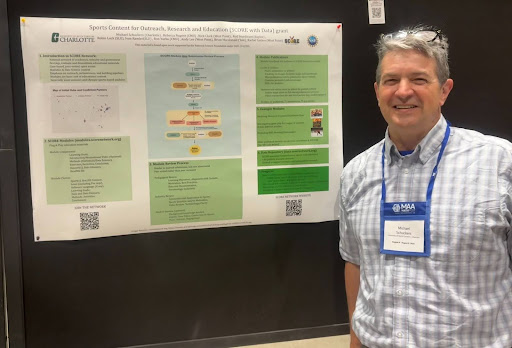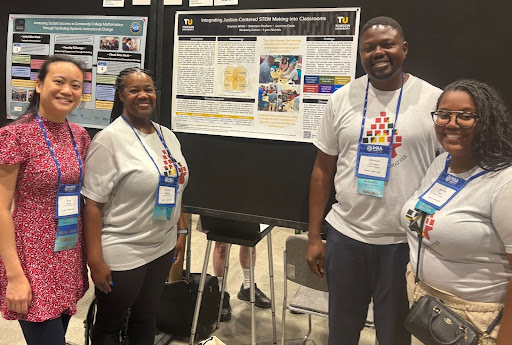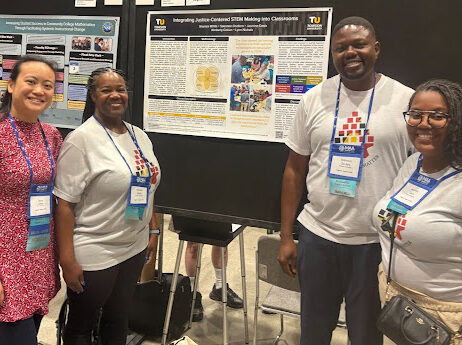By Erin Moss
The National Science Foundation (NSF), via their Division of Undergraduate Education (DUE), offers several different grants that can be used to improve undergraduate mathematics education. The August 2025 MathFest provided multiple opportunities to find support for writing a grant application, including a poster session, a panel, and one-on-one meetings with NSF program officers.
Poster Session
This year, PIs and Co-PIs presented their work on 21 grant projects at the Thursday morning NSF DUE Poster Session. Attendees learned about projects at large and small universities, public and private universities, and community colleges. They also made professional connections as they considered writing their own grants.
Fourteen Improving Undergraduate STEM Education (IUSE) grants were represented among the posters at MathFest this year. The IUSE funds projects that develop the knowledge base regarding evidence-based teaching practices while integrating them into the context of undergraduate STEM education. Michael Schuckers presented his team's poster that highlighted their IUSE project, Building a sustainable national network for developing and disseminating Sports Content for Outreach, Research, and Education in data science (SCORE). The SCORE Network connects academic and industry leaders with a common goal of developing the expertise of the next generation of data scientists and statisticians. It provides instructors with access to data and innovative educational modules that center realistic sports analytics data problems for adoption into their classrooms.

Six posters at MathFest featured NSF Scholarships in Science, Technology, Engineering, and Mathematics Program (S-STEM) grants that increase the number of academically talented low-income students graduating with STEM majors. S-STEM grants reduce financial pressure on the students by providing scholarships while simultaneously implementing curricular and co-curricular activities that support recruitment, retention, and academic success.
The Robert Noyce Teacher Scholarship Program recruits, prepares, and retains highly effective STEM teachers for work in high-need K-12 school districts. During the poster session we were able to chat with the PIs of one Noyce project, Making STEM Matter: Transforming Learning through Teacher Leadership, Justice-Centered Pedagogy, and Makerspace Technology. This five-year collaboration between Towson University and Morgan State University integrates teacher leadership and justice-centered pedagogy into a graduate course for in-service master teachers. Participants are trained to use STEM makerspaces to address issues of social justice relevant to the students and communities they serve.

While IUSE, S-STEM, and Noyce were represented in our poster session this year, additional NSF DUE programs may be of interest to you. Consider submitting grants for ATE, ECR, HSI, and the National STEM Teacher Corps Pilot Program. Be sure to check the NSF DUE website to identify the various submission due dates and guidelines associated with each program.
Panel Session and One-on-One Meetings
Immediately after Thursday’s poster session, we hosted a panel for anyone wanting to know more about grants from NSF DUE grants. Panelists included recent PIs and NSF DUE program officers. During small table talks, prospective grant proposers were able to ask specific questions about the process of grant submissions and learn from the experience of grant recipients. Folks were also able to sign up for appointments with NSF program officers to speak one-on-one about their project ideas and get advice about preparing their grant proposal.
Please stay connected to the DUE Point Blog stream and all other MAA media spaces as we will continue offering grant support in person at subsequent conferences, virtually via Webinars, and throughout the year on this blog!

Erin Moss is a Co-Editor of DUE Point and a Professor in the Department of Mathematics at Millersville University.
